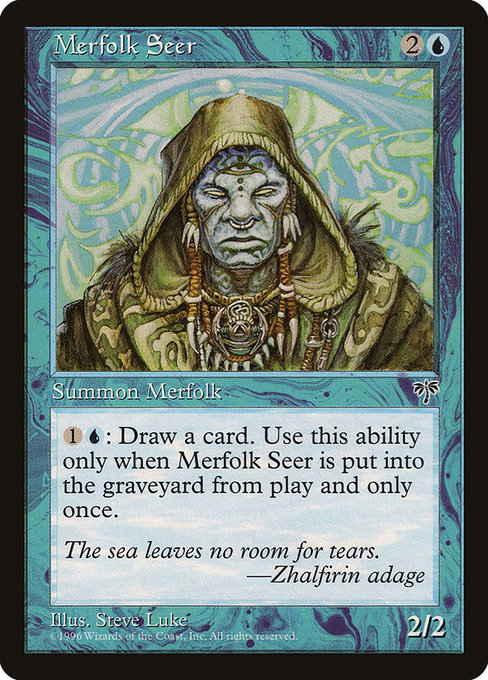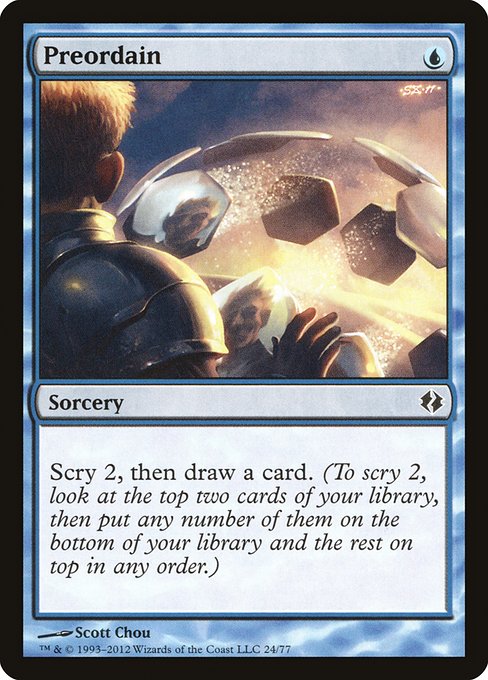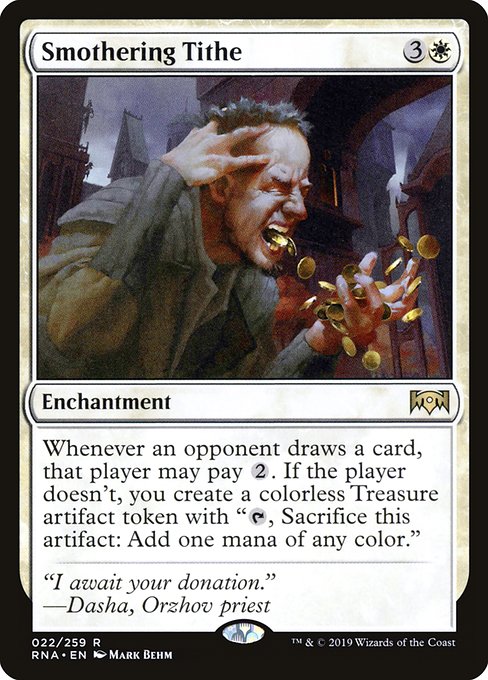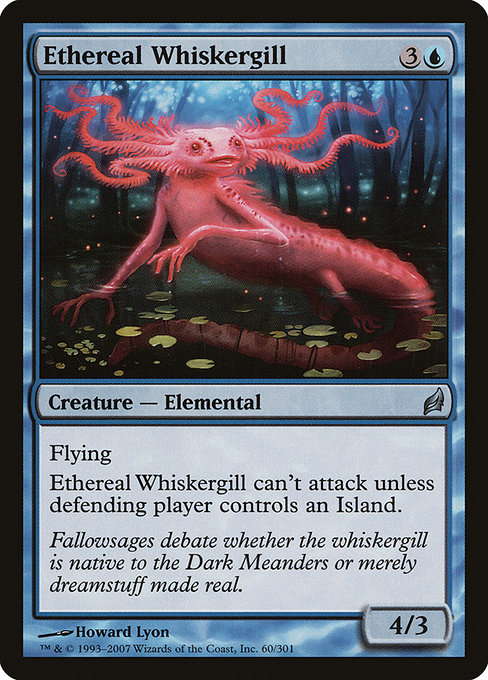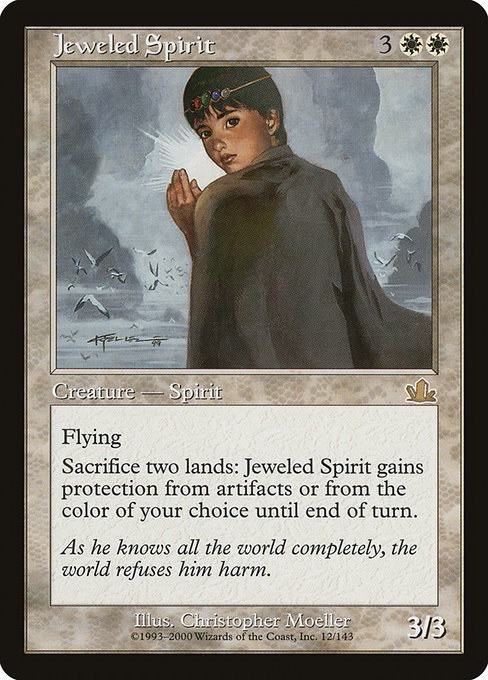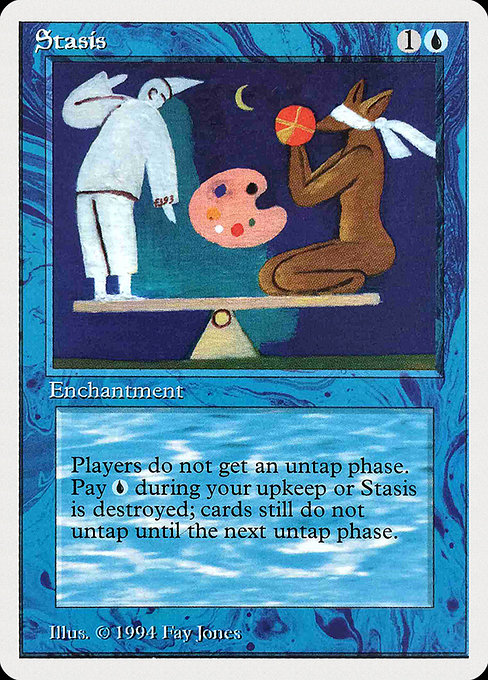
Stasis

Full Analysis
Generated on 2025-06-30T20:36:56.453863 • Legacy FormatStasis: A Powerful Enchantment with Unique Dynamics
Introduction
Stasis is a powerful enchantment that allows players to skip their untap step, providing a significant advantage in terms of tempo and card advantage. This review will delve into the intricacies of Stasis, exploring its card mechanics, interactions, strategic uses, combos, and deckbuilding roles.
Card Mechanics and Interactions
Stasis is an enchantment that affects the entire game state by allowing players to skip their untap step. When Stasis is on the battlefield, all players with untapped lands or other sources of mana must pass their untap step without drawing a card or playing any spells. This can be particularly problematic for players who rely heavily on early-game play or have tapped-out hands.
One key interaction to note about Stasis is its sacrifice clause at the beginning of upkeep. Unless the player pays {U} at the start of their upkeep, Stasis will be sacrificed and removed from the game. This creates a delicate balance between keeping Stasis active and paying the cost to maintain it. If a player chooses not to pay, they can still use Stasis in creative ways or simply discard it.
Strategic Uses, Combos, and Synergies
Stasis can be used in various strategic contexts depending on the player's goals and deck composition. Here are some examples:
- Midrange control decks: Stasis is often included in midrange control decks to allow players to conserve mana and disrupt their opponents' plans while still maintaining tempo.
- Combo decks: Stasis can be used to enable combo pieces to finish the game quickly by allowing them to skip the untap step and draw or gain advantage without interruption.
- Mill decks: Stasis is often paired with mill effects like Doom Blade or Cemetery to generate card advantage and create a powerful combo.
Some popular combos that utilize Stasis include:
- Pairing Stasis with Bane of Progress to create an untouchable combo engine
- Using Stasis with Memory Erode to disrupt opponents' graveyard-based strategies
Stasis also interacts well with other enchantments like Conceal, which can help protect the player's life total from removal effects.
Deckbuilding Roles and Archetypes
Stasis is typically included in control-oriented decks that prioritize disrupting their opponent's plans or generating card advantage. Here are some deck archetypes where Stasis has a significant impact:
- Control decks: Stasis helps control players maintain tempo while keeping their opponents at bay.
- Mill decks: Stasis enables mill strategies by allowing players to draw cards and generate advantage without interruption.
In general, Stasis is more effective in decks that have a strong foundation for card advantage or disruption, such as combo decks with flying creatures or graveyard-based strategies.
Format Viability and Competitive Context
Stasis has seen significant play in various formats, including Standard and Commander. In these formats, Stasis is often included in top-tier control decks like the Azorius Senate or Jund.
In Modern, Stasis has seen less play due to the presence of other control options like Path to Exile and Doom Blade. However, it can still be included in some top-tier decks for its unique synergy with combo pieces like Ancestral Recall or Memory Erode.
In Commander, Stasis has seen significant play in various colors including blue, white, and black.
Rules Interactions and Technical Notes
- Enchantment rules: Stasis is an enchantment that affects the entire game state by allowing players to skip their untap step.
- Upkeep phase: When Stasis is on the battlefield, it triggers its sacrifice clause at the beginning of upkeep unless paid for.
Examples of Stasis Interactions
Stasis can interact with other enchantments like Conceal to protect a player's life total from removal effects. For example, if a player casts Stasis and then Conceal on the same turn, they can use Stasis while still benefiting from the protection offered by Conceal.
Another important interaction is when Stasis is paired with other enchantments that allow players to draw cards or gain card advantage. In these cases, Stasis can provide a powerful additional benefit by allowing players to skip their untap step and then draw or gain advantage without losing tempo.
Art, Flavor, and Historical Context
Stasis was first printed in Urza's Legacy, a set released in 1998. The card features an illustration by Chris Rahn that captures the essence of Stasis as an enchantment with significant game-changing effects.
Over time, Stasis has become a staple in many control-oriented decks across various formats. Its unique ability to disrupt opponents' plans while maintaining tempo has made it a popular choice among players seeking an advantage over their foes.
Conclusion
Stasis is a powerful enchantment that allows players to skip their untap step, providing significant advantages in terms of tempo and card advantage. By understanding its mechanics, interactions, and strategic uses, players can unlock new possibilities for deckbuilding and gameplay.
Whether paired with other enchantments or used on its own, Stasis offers a unique synergy that can turn the tide of battle in favor of its wielder. Its history as an iconic card from Urza's Legacy only adds to its allure, making it a favorite among players seeking an advantage over their opponents.
